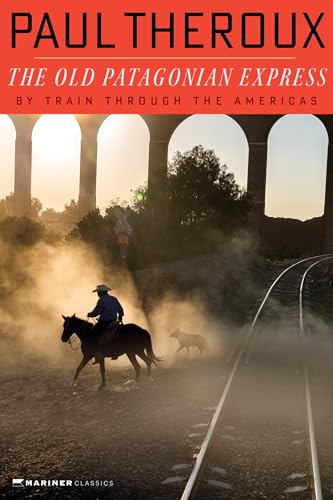 The plan is simple. Get on the train in Boston, just like all those other folks heading to work, except when they get off, keep going. And going and going and going until you can’t go any more. You’ll end up in Patagonia, at the far tip of South America. Such is the conceit of Paul Theroux’s 1979 book, The Old Patagonian Express
The plan is simple. Get on the train in Boston, just like all those other folks heading to work, except when they get off, keep going. And going and going and going until you can’t go any more. You’ll end up in Patagonia, at the far tip of South America. Such is the conceit of Paul Theroux’s 1979 book, The Old Patagonian Express
This, like many of Theroux’s books, is not a story of a place, but of all the places and people on the way to that place. The destination is of no consequence, merely a lodestar to set one’s bearings by and each layover, turn-off, and station platform bench is the reason to leave home. As Theroux himself puts it, in the opening chapter of Express,
The convention is to telescope travel writing, to start – as so many novels do – in the middle of things, to beach the reader in a bizarre place without first having guided him there… My usual question, unanswered by these – by most – travel books, is, How did you get there? Even without the suggestion of a motive, a prologue is welcome, since the going is often as fascinating as the arrival.
In Express, there is much to be fascinated by, thanks to the peculiarity of Latin American rail systems and Theroux’s desire to stick to his plan. Throughout the region, rail systems have been almost universally neglected. They are slow, old (he rides a steam train at one point), and out of the way (Theroux often notes how the stations are placed on the outskirts of towns rather than in the centers.) The interiors aren’t much better – heat, dust, insects, odors. Bouts with altitude sickness as he heads across the Andes only heighten the discomfort. More orthodox travelers take buses and planes, modes of transport that Theroux only stoops to when the rails are impassable thanks to jungle, landslide, or political strife. And so Theroux contrives to give us a book that is all prologue, all “going” and no arrival (or only a very small one, anyway).
There is a very enjoyable tongue-in-cheek element to Theroux’s travel books, wherein he bemoans the dull and sometimes capricious people he encounters as well as the unpleasant traveling conditions and muses at how foolish he was to even think that such a quest was a good idea. These complaints are both sincere and immensely entertaining thanks to Theroux’s skill as a storyteller. For example, there is Theroux’s detour to Machu Picchu, when he has occasion to ruminate on the student traveler (and those masquerading as student travelers):
There were advantages to being a student: student fares, student rates, student hostels, student entry fees. Great, hairy middle-aged buffoons complained at ticket counters and shouted “Look, I’m a student! Do me a favor! He doesn’t believe I’m a fucking student. Hey–” They were cut-priced tourists, idlers, vagabonds, freebooters who had gravitated to this impoverished place because they wanted to save money. Their conversation was predictable and was wholly concerned with prices, the exchange rate, the cheapest hotel, the cheapest bus, how someone (“Was he a gringo?”), got a meal for fifteen cents, or an alpaca sweater for a dollar and bunked with some Aymara Indians in a benighted village. They were Americans, but they were also Dutch, German, French, British, and Scandinavian; they spoke the same language, always money. Their boast was always how long they had managed to hang on here in the Peruvian Andes and beat the system.
This is not to say that Theroux looks down upon these backpackers because of their thriftiness – he travels in much the same way they do – mostly just their insensitivity.
Theroux’s many complaints, entertaining as they are, set us up for the moments when his trip is worthwhile. Unlike basic cable travel and food shows, on which the hosts coo with glee at every sight and taste, when Theroux is impressed by something, the reader knows it is impressive, and when he is pleased, one knows his experience is sublime. The highlight of the book, at least for this bibliophile, is his series of visits with Jorge Luis Borges in Buenos Aires. Theroux reads to the blind Borges almost nightly for a stretch, and mischievous Borges takes Theroux to dinner at the local restaurant. Theroux’s peek into Borges’ life and mannerisms is fascinating, and the episode epitomizes the the best elements of travel, when surprise encounters can lead to friendship. Similarly rewarding are the friendships Theroux makes with many other less well known locals throughout the two Americas. So too are the simple moments of exhilaration, when Theroux has disembarked from a rickety train in a place that is new and closer to his ultimate goal. In these moments, all the painful, stuffy, dusty rides are worth it. And home, however far away, isn’t missed quite so much.
See Also: Andrew’s Travel Writing by Train and Mrs. Millions’ thoughts on the book.



